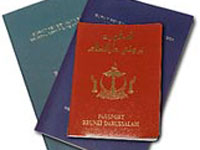Libya not to admit tourists without Arabic translation of passports
The Libyan government forbids tourists entry if they don't have an Arabic translation of their passport - even if they have a valid visa.

The sudden change in entry rules was revealed after planeloads of European tourists were forced to return home after touchdown in Libya. Tripoli has not officially announced the change and government officials could not be reached for comment Monday.
The development reflects confusion in government policies, amid recent strides by Libya to promote itself as a lucrative tourist destination and to inch closer to a long-sought political goal of getting back into the West's good graces after years of ostracism.
It also makes Libya the only Mideast country to take such an unprecedented step.
Eighteen French nationals were stranded at Tripoli International Airport since Sunday night, until France's ambassador to Libya intervened Monday on their behalf and they were allowed to return home, French Foreign Ministry spokeswoman Pascale Andreani said in an online briefing Monday.
Another 172 French citizens who arrived Sunday evening in the city of Sebha, in the south of Libya, were not allowed to get off their charter flight run by Air Mediterranee. The plane returned to France, arriving in Paris overnight, Andreani said.
Another 83 French nationals, already in Libya, were not able to leave Sebha on Sunday night, as the rule change also applies to tourists seeking to leave. They were expected to be allowed to leave later Monday, Andreani said.
"A modification of Libyan regulations regarding the entry and departure from (Libyan) territory appears to have taken place on Nov. 11 without any prior information, and appears to have been retroactive," Andreani said.
The spokeswoman said that "holders of foreign passports in which the personal information is not translated into Arabic are no longer authorized to enter Libya or to leave its territory."
She added the French Foreign Ministry was advising French nationals to delay visits to Libya until the issue is clarified.
Some 37 passengers were sent back to Zurich, Switzerland, after arriving in Libya Sunday on a Swiss flight, also because they were not carrying Arabic-language translation of their passports, Jean-Claude Donzel, the airline's spokesman, told The Associated Press.
He said the airline's office in Libya was caught unaware of the new rules, which came into force just hours before the Swiss plane landed Sunday.
Swiss, which is owned by German carrier Lufthansa, is trying to contact customers who have booked flights to Libya to inform them of the new regulations, Donzel said. Passengers also will be advised of the changes at check-in and before boarding any plane bound for Libya.
Diplomatic efforts to resolve the situation are also under way, Donzel said, but did not elaborate.
According to the Web site of the Swiss daily Neue Zuercher Zeitung, passengers aboard Austrian Airlines, Lufthansa and British Airways flights were also affected and had to return home.
Germany's Foreign Ministry posted a brief note on its Web site saying that it "became known" on Sunday that Libya was turning back travelers at the border, even if they have a valid visa, unless they also have Arabic passport translations.
Tourists have long shunned Libya, but its rogue state status abruptly changed in 2003, when U.N. sanctions, imposed 11 years earlier, were lifted after the country's leader Moammar Gadhafi announced he was dismantling its nuclear weapons program.
That same year, Libya accepted responsibility for the 1988 bombing of Pam Am flight 103 over Lockerbie, Scotland, and agreed to pay restitution to the families of the 270 victims. Last year, the U.S. State Department removed Libya from its list of state sponsors of terrorism.
Libya has since pushed to promote thousands of kilometers (miles) of its pristine Mediterranean coastline, sweeping desert sand dunes and ancient ruins that rival Greece and Italy, as a travel destination.
Subscribe to Pravda.Ru Telegram channel, Facebook, RSS!




